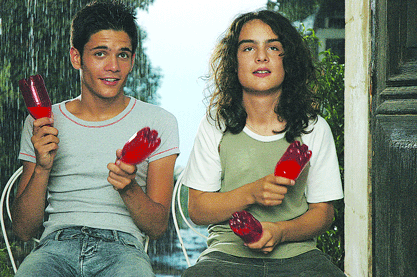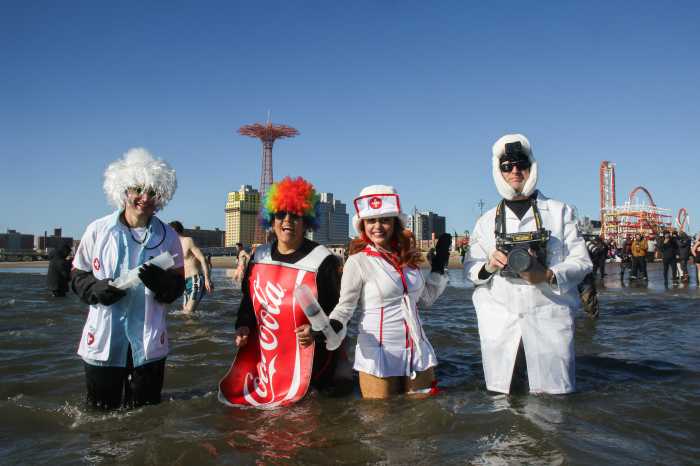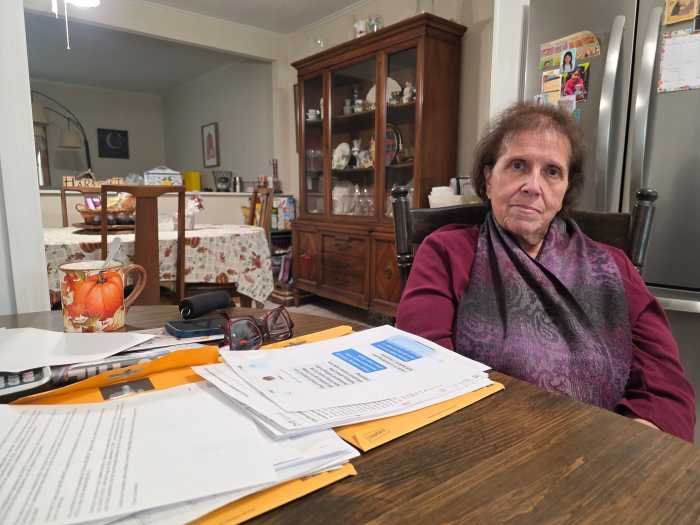Olivier Ducastel and Jacques Martineau bring back the French farce
Film farce is often thought of as a French import and with “Cote D’Azur” directors Olivier Ducastel and Jacques Martineau continue in that tradition. Probably best known to American audiences for the socially conscious “The Adventures of Felix” (2000) and the HIV musical “Jeanne and the Perfect Guy” (1998), Ducastel and Martineau, lovers and collaborators, present their gayest work yet.
Gay in both the old sense and the homosexual sense of the word.
Unlike many French films of the past half-decade, “Cote D’Azur” is good, old-fashioned, ridiculous fun, putting a gay spin on the age-old plot device of sexual misunderstandings and people running around slamming doors behind themselves in vaudevillian style.
The film presents a typical family on vacation with two teenagers in tow. Beatrix (Valeria Bruni Tedeschi) suspects that her son might be gay, and doesn’t mind that he has brought along a friend. Her husband Marc (Gilbert Melki) is overly preoccupied with his children’s sex lives, and is as nervous as a cat most of the time.
Beatrix keeps mentioning her Dutch heritage, as though emblematic of her tolerance for the idea that her son Charly (Romain Torres) might be sleeping with his friend Martin (Edouard Collin). Ironically, Charly is not gay, but Martin is, and he sneaks out nightly to seek sex in the local cruising grotto.
A lot of the vaudeville in the movie comes into play as both Charly and Marc follow Martin on his nocturnal adventures. Beatrix has good reason to be liberal on questions of sexual mores—her own lover, Matthieu (Jacques Bonnaffe), has followed the family on its vacation, and the couple regularly romp under Marc’s nose. The misunderstandings escalate into complications when an ex-lover of Marc’s also appears on the scene––involved, though, with another member of the vacation group.
We hear that “Vacations were meant to break routine,” and for the adult characters this means some level of sexual anarchy. Beatrix not only has an unfettered good time with Matthieu, but we also get the impression that her sex with Marc is a rare occurrence. The “routine” in fact may be a cover. Both Marc and Beatrix seem to want something outside their marriage. Beatrix says she “chose” Marc, in a way suggesting a decision more practical than romantic. Marc has his own suppressed desires, which get untied by the extended discussions of the two boys’ possible sexual relationship. The film has the feel of “Nico and Dani,” but with parents along this time.
The film itself also breaks with formula, ending with a nonsensical musical number, “Coquilles et crustaces.” Along with being a lot of fun, “Cote D’Azur” has some wonderful shots as well. During a rainstorm, we see the boys framed by one window while another frames the parents. Co-directors Ducastel and Martineau achieve a good sense of “alone together” both visually and thematically. It takes Martin, someone outside the family, to notice that everyone seems is playing games.
Ducastel and Martineau met while making a movie together ten years ago, and have co-directed four films since. Each man has a specialty he brings to the films. Martineau writes the initial drafts of the scripts, which change after discussions between the two. Ducastel assumes the lead role in directing.
Both men, in interviews, were quick to point out that “Cote D’Azur” is “only a movie.”
“Art can be something funny,” Martineau told Gay City News.
The two men count Erich Rohmer, Jacques Demy, and Francois Truffaut among their influences.
Their gay teen character, Martin, pokes fun at the whole concept of “coming out,” calling it an “English notion.”
Ducastel said the film is not a “coming out” movie, noting that the issue is considerably less freighted than it was 20 years ago.
gaycitynews.com



































